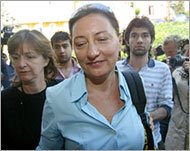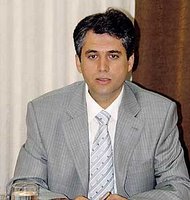
Monitoring media freedoms and rights in Turkey, BIA² discloses 56 "Freedom of Expression" cases launched against 67 individuals from April through June as government still seeks to impose new restrictions. Turkey pays ECHR 332,000 YTL in 1.5 years.
BIA News Center
11/07/2006 Erol ONDEROGLU BİA (Istanbul) - "Perihan Magden, Birgul Ozbaris and Gokhan Gencay face up to 27 years imprisonment in total on charges of 'discouraging the public from military service'.
Everyone from journalists to tradespeople collide with freedom of expression limitations as charges are pressed. While Turkey loses at European Court of Human Rights (ECHR) freedom of expression cases, the taxpayer has to pay the compensation collectively".
The 2006 2nd Quarterly Report prepared by the "Network in Turkey for Monitoring and Covering Media Freedom and Independent Journalism" - BIA² Media Monitoring Desk and covering the months of April, May and June discloses factual details on the situation of the media in relation to rights and freedoms.
The 12-page BIA² report discloses that 56 new "Freedom of Expression" have been launched against 67 individuals from April through June as the government still seeks to impose new restrictions.
Covering the persecution of journalists and writers Nese Duzel, Sebati Karakurt, Perihan Magden, Hrant Dink, Birgül Ozbaris, Gokhan Gencay, Abdurrahman Dilipak, Memik Horuz, Evrim Dengiz, Nesrin Yazar, Rustu Demirkaya, Elif Shafak, Semih Sokmen, Aslı Bicen, Sabri Ejder Ozic, Murat Belge, Murat Yetkin, Hasip Kaplan, Emine Senlikoglu, Mehmet Sevket Eygi and Musa Agacik the report stresses that Turkey has already been made to pay over 332,000 YTL (USD 207.500) in compensation in only 1.5 years at cases heard by the ECHR.
"While the reforms on the road to European Union membership were important steps for freedom of expression the Justice and Development Party (AKP) government has not only ignored the grave consequences created by the Criminal Code in just a year but has even passed a new form of the Anti-Terror Law (TMY) knowing it only brought more sentences at the ECHR in the past and does so today too" says the report.
BIA²: Government takes freedoms lightly
BIA² Media Monitoring Desk's report deals with the situation of journalists, writers and activists persecuted and prosecuted in Turkey under the headlines "attacks and threats", "detentions and arrests ", "trials and initiatives", "European Court of Human Rights", "RTUK applications", "adjustments and seeking justice" and "Reaction to censorship".
The report contains information on 56 court cases launched against 67 people, four journalists seeking their rights at local courts and 15 individuals who have applied to the European Court of Human Rights.
Charges made under Turkish Penal Code (TCK) article 288 (attempting to influence justice), 301/159 (Insulting Turkishness and state institutions), 318 (Discouraging the people from military service), 216 (Inciting hatred and enmity) are highlighted in the report together with Prime Minister Recep Tayyip Erdogan's reply to criticism of his conduct by filing for damages.
The "Independence" of Justice
The report cites developments over the past three months that reveal problems with regard to the independence of justice in Turkey.
It notes that while the Supreme Council of Judges and Prosecutors has no structural or functional autonomy, the fact that the Office of the Chief of General Staff and the Police force are at top of the list of institutions filing criminal complaints "creates a concerning picture for the freedom of media and expression".
"Covering a wide section of society from journalists to tradespeople at least 40 people have been put on trial or are still being tried under article 159 of the old TCK and article 301 of the new Code" it says.
Anti-Terror Law
The report states that while the consequences of the Penal Code are so clear the government's approval of the Anti-Terror Law (TMY) means "the freedom of media and expression of opinions is taken lightly".
The TMY that was passed by Parliament on June 29 and is currently the source of journalist Nese Duzel and Sebati Karakurt's trial does not only increase prison terms and extend them to new areas but in certain conditions also extends the criminal responsibility in publications from newspaper owners and editor-in-chiefs to "publication executives" the report warns.
It adds that the law amends previous articles in such way "that monetary fines are now changed to prison terms and allows the stopping of publications will also be a serious obstacle in the debate of issues such as the Kurdish problem and media coverage of these issues".
Says the report:
"The case launched against journalist Hrant Dink for his article series 'Armenian Identity' under article 159 turned into an adventure displaying differences of evaluation between local courts and the Supreme Court, constituting an important example. As observed in other "inciting hatred and enmity" cases, the Dink case also damaged "the feeling of justice" being upheld.
Human rights activists have now tied hoped to President Ahmet Necdet Sezer's veto of the TMY which has in the past 1.5 year alone cost Turkey 332.500 YTL at the European Court of Human Rights".
10 attacks on media, journalists in prison go up to 4
According to the report, nine journalists and one publishing company have been attacked in the past three months while two journalists have been threatened.
In the same period of last year the number of attacks recorded was 7. Another determination made by the report is that journalists working for the Kurdish press are frequently being charged with "assisting the PKK".
"Isci Koylu" [Workers Peasants] magazine Editor-in-Chief Memik Horuz was the only journalist "under arrest in prison in the scope of press freedoms" until the new year but since then Dicle News Agency (DİHA) reporters Evrim Dengiz, Nesrin Yazar and Rustu Demirkaya have been added to the list bringing up the number to 4 in six months. "Assisting the PKK" cases launched against the three journalists continues.
"Discouraging military service" a spreading threat
"Ulkede Ozgur Gundem" newspaper reporter Birgul Ozbaris has been charged seven times in trials related to her news coverage and interviews on conscientious objection and she faces 21 years imprisonment if found guilty.
"Birgun" newspaper Sunday Supplementary editor Gokhan Gencay interviewed conscientious objector Erkan Bolot, "Yeni Aktuel" magazine writer Perihan Magden wrote an article titled "Conscientious Objection is a Human Right". Both journalists face three years imprisonment each.
With amendments made in the Military justice and trial procedures, the trial of individuals such as Abdurrahman Dilipak at military courts will not be possible but civilian courts will be allowed to attribute to the Military Criminal Code where such trials are heard.
Article 301 puts over 40 on trial
The allegation of "Insulting Turkishness" has last been leveled against "Father and Bastard" novel author Elif Shafak, Metis Publishing House chief Semih Sokmen and translatorAsli Bicen.
An investigation on the same charge was also launched against the Head of the Armenian Apostolic Church Karekin II.
The justice system and security forces continue to show tolerance to Unity of Jurists group member attorney Kemal Kerincsiz and his associates who spread violence into court cases.
Radio broadcaster gets 6 months under 301
The Adana 5th Court of First Instance sentenced radio broadcaster Sabri Ejder Ozic to 6 months imprisonment under article 301 for "publicly insulting the parliament" despite opinions presented to the court by the Court of Appeals Public Prosecutor and the court's own prosecutor. The court neither deferred the sentence nor turned it into a monetary fine.
Yetkin faces 4.5 years for criticizing court case
It appears that the allegation of "attempting to influence a fair trial" that faces journalists every time judicial decisions are debated, is to continue to be a long-term problem.
Even though the case launched against "Radikal" newspaper writer Murat Belge for criticizing a court decision banning a conference on Ottoman Armenians resulted with an acquittal, four writers from "Radikal" and "Milliyet" newspapers were not fully cleared when the prosecution appealed against their acquittal.
On top of these, a prosecutor now demands 4.5 years imprisonment for "Radikal" newspaper writer Murat Yetkin for criticizing the court case against renown author Orhan Pamuk.
TCK's article 216 is also leading to different consequences in judiciary practice. Jurist Hasip Kaplan who expressed his views on contemporary issues on a television program aired by "Flash TV" was acquitted in the case where he was charged with "inciting hatred and enmity".
However, journalist-writer Emine Senlikoglu was sentenced to 12 months imprisonment for expressing her views on a television program she attended in Manavgat in the year 2000.
This allegation was also leveled against "Milli Gazete" newspaper writer Mehmet Sevket Eygi in the past three months.
Following up on the kicking
Journalist Musa Agacik who four years ago was covering Prime Minister Erdogan during a festival was kicked by the PM's bodyguard Murat Oksuz . Star newspaper reporter Agacik could find no one to testify as witness to the assault but pursued his claim that resulted with an administrative monetary fine for Oksuz. (EO/II/YE)
* The full report in Turkish can be obtained from Bianet. Please contact Erol Onderoglu, Tel: 0212 251 1503 Fax: 251 1609 e-mail: hukuk@bianet.org for more information.











